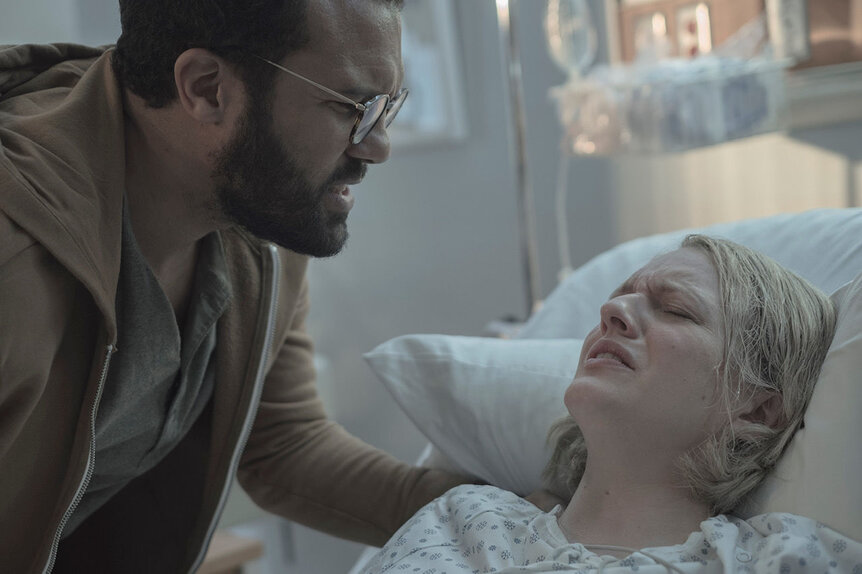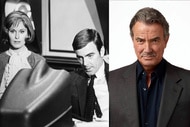Create a free profile to get unlimited access to exclusive videos, sweepstakes, and more!
Emmy Contender: Directing The Handmaid's Tale's revered birth scene was a deeply personal affair

Welcome to Emmy Contenders 2019. This month, SYFY WIRE is speaking to a long list of actors, artists, and artisans whose work earned them Emmy nominations this year. Today we speak with Daina Reid, the Emmy-nominated director for Hulu's The Handmaid's Tale.
One of the most harrowing situations our heroine June faces in The Handmaid's Tale is the moment in which she is forced to give birth alone, with no help — no doctors, no drugs. This Season 2 episode, "Holly," has been praised by fans and critics alike for offering a birth scene that is beautiful, brutal, and incredibly realistic. The credit for that goes in large part to director Daina Reid, who drew upon her own childbirth experiences and consulted a midwife in her native Australia to map out a labor and birth schedule for a mother having a second child.
Reid chatted with SYFY WIRE about the politics of depicting birth and the lone moment that made her laugh behind the monitor.
Between your nominated-episode "Holly" and this season's "Heroic," which took place during June's hospital vigil, you seem to direct the show's most gut-wrenching episodes!
I think they just like to torture me over there! [Laughs] "Here's another torturous one. See what you can do to poor Elisabeth Moss this time."
It's kind of a fortuitous coincidence that I ended up with episodes largely in a single location and mostly with Elisabeth Moss.
When people talk about this episode, they praise how realistic the birth scene is, and they note how rare that is. Usually, when a birth is depicted in film and television, the mother is not in charge. It's not that messy. Or it's a cliché for comedic effect.
Yeah. I don't want to be political, but you kind of can't help it. One of the reasons I became a director and do what I'm doing is because you want to see your own stories depicted correctly in a way that resonates with you. Not in a way where you go, "That person is having a child, but I can't relate to that."
So that's driving me as a female director, to tell the story of my own gender realistically, so you can affect people. That was very much what I wanted to do, because there are a lot of men directing out there, and not many of them have given birth! [Laughs] So the experience is not there. If you have it, let's put it on screen. Maybe you didn't do it all alone, the way June did, but it's about finding all those things — when you've felt alone, when you've struggled with a crisis — and putting all those elements and all those fears in there.
How did you collaborate with Elisabeth to get that really primal performance?
I was really lucky on "Holly" to get three hours to hash it out with her and plot out June's journey. The moment she goes, "I get where you're coming from," and then tear it up, it's just amazing to watch her process — the risk-taking and the bravery.
That performance is astonishing. It's just something else. There's just such an energy to it. One of the interesting things that she came up with was the idea of the fear in all the flashbacks in "Holly." June is very, very frightened when she's having Hannah. She's in a hospital, she has people around her, she has everything at her disposal, and yet she's really scared: "I don't think I can do it." And then here she is in Gilead, all by herself, and she has all this bravery. Because she has to. There is nowhere else to go. There is no room to be frightened when she's giving birth in that house, all by herself. So working with those two different sides was something that Elisabeth wanted to explore — where she used to be, and where she is now.
We also worked with sound and voice a lot to get that primal sound. We worked hard on what those sounds were, and how to connect them to her body as if your body had a baby that you are about to get out.
In both "Holly" and "Heroic," June has an opportunity to strike out at Serena. She could have shot her with a shotgun in "Holly," but she chooses not to. But then when she's not quite in her right mind in "Heroic," she slices her with a blade.
Oh, yeah! I just noticed that. She almost kills Serena twice, but she never can. That's the humanity of June.
Serena sometimes can be an ally, and June is always open to that. She would never shut that door. Although Serena then gets dragged back into whatever mindset she's in, and that's disappointing. I don't think June could ever hurt Serena. I don't think she ever would kill her. If June meant to kill her, she would have. But what do I know? I'm not writing it! [Laughs]
I think Serena's a real interesting character, because even among us now, I don't want to talk about Donald Trump, but there are a lot of women who seem to support the side that oppresses them in the world we live in right now, and Serena is one of those people.
One of the things people sometimes miss in this episode is the hope and humor.
There's a tiny moment that made me laugh out loud behind the monitor. She's going in and out of the house, trying to get organized. She's trying to move, she doesn't know who's coming back to that house or when, and she has to get out. And so she's packed. She's found the key. She closes the trunk of the car. And then she realizes that she's still wearing the Handmaid dress. And you can see this little expression in Lizzie's face, like, "Oh for f***'s sake." It's just a little, "Crap." She has to go back to the house! She has to change!
It's just one thing after another. And that's just that little spark of humor that Lizzie found, even in all that darkness. It really made me smile.















